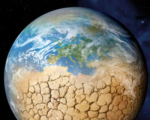Scientists Suggest Decline in Planetary Albedo May Contribute to Sharp Increase in Global Temperatures

Researchers from the Alfred Wegener Institute (AWI) have uncovered a potential link between a sharp decline in the Earth’s planetary albedo and the unprecedented rise in global temperatures in 2023. The study suggests that the reduction in low-altitude clouds is contributing to this alarming trend, which has pushed the global mean temperature nearly 1.5°C above pre-industrial levels. Dr. Helge Goessling, a climate modeller at AWI and lead author of the study, highlighted that this phenomenon could explain an additional 0.2°C of warming that current climate models, including factors like greenhouse gases, El Niño, and volcanic activity, fail to account for.
The research, published in Science, draws attention to the significant loss of low-altitude cloud cover, especially in the northern mid-latitudes and tropics. These clouds, which are typically reflective, play a crucial role in maintaining Earth’s energy balance by reflecting sunlight back into space. The data from NASA and the European Centre for Medium-Range Weather Forecasts (ECMWF) show that 2023 experienced the lowest planetary albedo since at least 1940, marking a notable shift in the planet’s reflectivity. With less sunlight being reflected, more heat is absorbed, which accelerates global warming.
The reduction in low-altitude clouds, which provide a natural cooling effect, contrasts with higher clouds that tend to trap heat, further exacerbating the warming process. The study suggests several factors may be contributing to this change, including stricter marine fuel regulations, which have reduced aerosol concentrations needed for cloud formation, and shifts in oceanic conditions. However, Dr. Goessling proposed that there could be a significant feedback loop at play, where global warming leads to further reduction in cloud cover, which, in turn, enhances warming—a vicious cycle that could escalate the effects of climate change.
These findings underscore the complexity of climate change and the need for more comprehensive models that account for all contributing factors. While greenhouse gas emissions and natural climate phenomena like El Niño remain key drivers of global warming, the reduction in planetary albedo due to changing cloud patterns presents an important piece of the puzzle. Researchers are calling for further investigation into how these feedback loops may accelerate the pace of global warming and what measures can be taken to mitigate their effects.





















